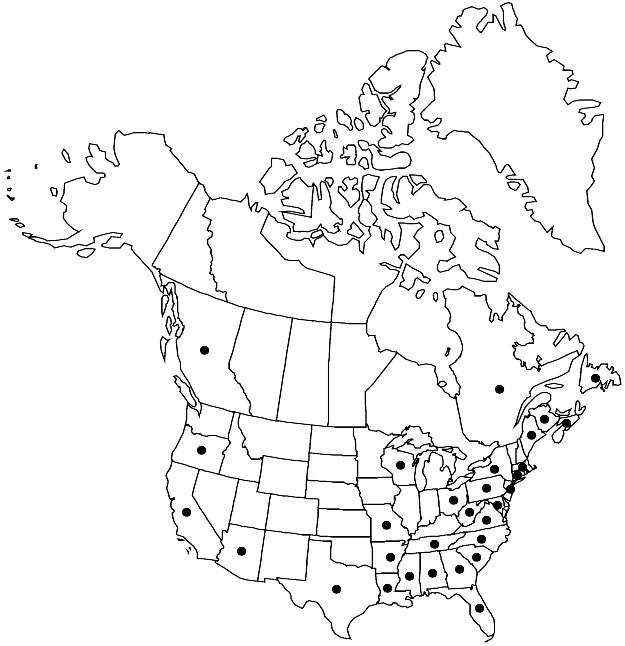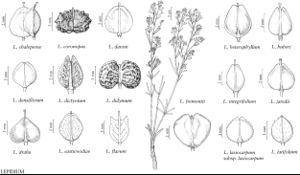Difference between revisions of "Lepidium didymum"
Syst. Nat. ed. 12, 2: 433. 1767.
Mant Pl. 1: 92. 1767.
FNA>Volume Importer |
imported>Volume Importer |
||
| (6 intermediate revisions by 2 users not shown) | |||
| Line 6: | Line 6: | ||
|place=12, 2: 433. 1767 | |place=12, 2: 433. 1767 | ||
|year=1767 | |year=1767 | ||
| − | }}{{Treatment/Publication | + | }}, {{Treatment/Publication |
|title=Mant Pl. | |title=Mant Pl. | ||
|place=1: 92. 1767 | |place=1: 92. 1767 | ||
| Line 15: | Line 15: | ||
|name=Carara didyma | |name=Carara didyma | ||
|authority=(Linnaeus) Britton | |authority=(Linnaeus) Britton | ||
| − | }}{{Treatment/ID/Synonym | + | |rank=species |
| + | }} {{Treatment/ID/Synonym | ||
|name=Coronopus didymus | |name=Coronopus didymus | ||
|authority=(Linnaeus) Smith | |authority=(Linnaeus) Smith | ||
| − | }}{{Treatment/ID/Synonym | + | |rank=species |
| + | }} {{Treatment/ID/Synonym | ||
|name=Senebiera didyma | |name=Senebiera didyma | ||
|authority=(Linnaeus) Persoon | |authority=(Linnaeus) Persoon | ||
| − | }}{{Treatment/ID/Synonym | + | |rank=species |
| + | }} {{Treatment/ID/Synonym | ||
|name=Senebiera incisa | |name=Senebiera incisa | ||
|authority=Willdenow | |authority=Willdenow | ||
| − | }}{{Treatment/ID/Synonym | + | |rank=species |
| + | }} {{Treatment/ID/Synonym | ||
|name=Senebiera pinnatifida | |name=Senebiera pinnatifida | ||
|authority=de Candolle | |authority=de Candolle | ||
| + | |rank=species | ||
}} | }} | ||
|hierarchy=Brassicaceae;Brassicaceae tribe Lepidieae;Lepidium;Lepidium didymum | |hierarchy=Brassicaceae;Brassicaceae tribe Lepidieae;Lepidium;Lepidium didymum | ||
| Line 42: | Line 47: | ||
|elevation=0-1000 m | |elevation=0-1000 m | ||
|distribution=B.C.;N.B.;Nfld. and Labr. (Nfld.);N.S.;Que.;Ala.;Ariz.;Ark.;Calif.;Conn.;Fla.;Ga.;La.;Maine;Md.;Mass.;Miss.;Mo.;N.J.;N.Y.;N.C.;Ohio;Oreg.;Pa.;S.C.;Tenn.;Tex.;Va.;W.Va.;Wis.;South America;introduced also in Mexico (Sinaloa);Central America (Honduras);Europe;Asia;s Africa;Australia. | |distribution=B.C.;N.B.;Nfld. and Labr. (Nfld.);N.S.;Que.;Ala.;Ariz.;Ark.;Calif.;Conn.;Fla.;Ga.;La.;Maine;Md.;Mass.;Miss.;Mo.;N.J.;N.Y.;N.C.;Ohio;Oreg.;Pa.;S.C.;Tenn.;Tex.;Va.;W.Va.;Wis.;South America;introduced also in Mexico (Sinaloa);Central America (Honduras);Europe;Asia;s Africa;Australia. | ||
| + | |introduced=true | ||
|tables= | |tables= | ||
|references= | |references= | ||
| Line 50: | Line 56: | ||
-->{{#Taxon: | -->{{#Taxon: | ||
name=Lepidium didymum | name=Lepidium didymum | ||
| − | |||
|authority=Linnaeus | |authority=Linnaeus | ||
|rank=species | |rank=species | ||
| Line 66: | Line 71: | ||
|publication year=1767;1767 | |publication year=1767;1767 | ||
|special status= | |special status= | ||
| − | |source xml=https:// | + | |source xml=https://bitbucket.org/aafc-mbb/fna-data-curation/src/2e0870ddd59836b60bcf96646a41e87ea5a5943a/coarse_grained_fna_xml/V7/V7_935.xml |
|tribe=Brassicaceae tribe Lepidieae | |tribe=Brassicaceae tribe Lepidieae | ||
|genus=Lepidium | |genus=Lepidium | ||
Latest revision as of 22:37, 5 November 2020
Annuals; (fetid); glabrous or pilose. Stems few to several from base, erect to ascending or decumbent, branched distally, 1–4.5(–7) dm. Basal leaves (soon withered); not rosulate; petiole 0.5–4(–6) cm; blade 1- or 2-pinnatisect, 1–6(–8) cm, margins (of lobes) entire or dentate (sometimes deeply lobed). Cauline leaves shortly petiolate to subsessile; blade similar to basal, smaller and less divided distally, lobes lanceolate to oblong or elliptic, 1.5–3.5(–4.5) cm ×5–12 mm, base not auriculate, margins (of lobes) entire, serrate, or incised. Racemes elongated in fruit; rachis glabrous or pubescent, trichomes straight, cylindrical. Fruiting pedicels divaricate to horizontal, straight slightly recurved, (terete), 1.4–2.5(–4) × 0.15–2 mm, glabrous or sparsely pubescent adaxially. Flowers: sepals (tardily deciduous), ovate, 0.5–0.7(–0.9) mm; petals white, elliptic to linear, 0.4–0.5 × ca. 0.1 mm, claw absent; stamens 2, median; filaments 0.3–0.6 mm; anthers 0.1–0.2 mm. Fruits schizocarpic, didymous, 1.3–1.7 × 2–2.5 mm, apically not winged, apical notch 0.2–0.4 mm deep; valves thick, rugose, strongly veined, glabrous; style absent or obsolete, included in apical notch. Seeds ovate, 1–1.2 × 0.7–0.8 mm. 2n = 32.
Phenology: Flowering Mar–Jul.
Habitat: Roadsides, waste areas, lawns, pastures, fields, gardens, disturbed areas
Elevation: 0-1000 m
Distribution

Introduced; B.C., N.B., Nfld. and Labr. (Nfld.), N.S., Que., Ala., Ariz., Ark., Calif., Conn., Fla., Ga., La., Maine, Md., Mass., Miss., Mo., N.J., N.Y., N.C., Ohio, Oreg., Pa., S.C., Tenn., Tex., Va., W.Va., Wis., South America, introduced also in Mexico (Sinaloa), Central America (Honduras), Europe, Asia, s Africa, Australia.
Discussion
Selected References
None.
